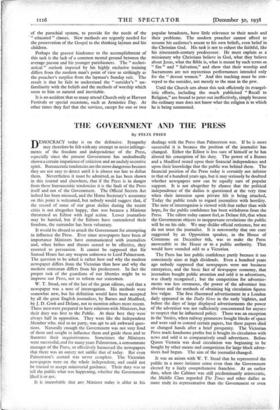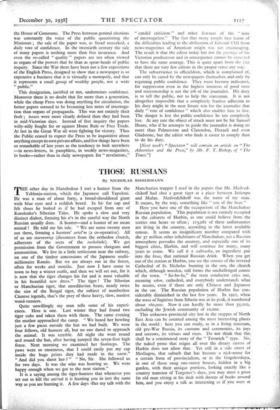THE GOVERNMENT AND THE PRESS
By FELIX FRIES
DEMOCRACY today is on the defensive. Sympathy may therefore be felt with any attempt to resist infringe- ments of the freedom and independence of the Press, especially since the present Government has undoubtedly shown a certain impatience of criticism and an unduly secretive spirit. Bureaucratic tendencies are the more dangerous because they are not easy to detect until it is almost too late to defeat them. Nevertheless it must be admitted, as has been shown in this journal and elsewhere, that if the Press is in danger from these bureaucratic tendencies it is the fault of the Press itself and not of the Government. The Official Secrets Act indeed has been misused, and the Home Secretary's assurance on this point is welcomed, but nobody would suggest that, if the record of some of our great dailies during the recent crisis is not altogether happy, that was because a Minister threatened an Editor with legal action. Lesser journalists may be harried, but if the Editors have surrendered their freedom, the surrender has been voluntary.
It would be absurd to attack the Government for attempting to influence the Press. Ever since newspapers have been of importance Ministers have communicated with journalists and, when bribes and threats ceased to be effective, they resorted to persuasion. It cannot be supposed that Sir Samual Hoare has any weapon unknown to Lord Palmerston. The question to be asked is rather how and why the modem newspaper differs from the Victorian than how and why the modem statesman differs from his predecessor. In fact the proper task of the guardians of our liberties might be to improve our Press, not to reform our statesmen.
W. T. Stead, one of the last of the great editors, said that a newspaper was a note of interrogation. His methods were somewhat new, but his definition would have been accepted by all the great English journalists, by Barnes and Mudford, by J. D. Cook and Delane, not to mention others more recent. These men were prepared to have relations with Ministers, but their duty was first to the Public. At their best they were always half in opposition. They were like the independent Member who, tied to no party, was apt to ask awkward ques- tions. Naturally enough the Government was not very fond of them and sought to influence them and guide them and to frustrate their inquisitiveness. Sometimes the Ministers were successful, and for many years Palmerston, a consummate manager of the Press, so effectively harnessed the newspapers that there was an outcry not unlike that of today. But even Palmerston's control was never complete. The Victorian newspapers were on the whole independent, and could not be trusted to accept ministerial guidance: Their duty was to tell the public what was happening, whether the Government liked it or not.
_ It is improbable that any Minister today is abler in his dealings with the Press than Palmerston was. If he is more successful it is because the position of the journalist has changed. Either the Editor is less sure of himself or he has altered his conception of his duty. The power of a Barnes and a Mudford rested upon their financial independence and upon their knowledge that the public was behind them. The financial position of the Press today is certainly not inferior to that of a hundred years ago, but it may seriously be doubted whether newspapers now can be equally sure of popular support. It is not altogether by chance that the political independence of the dailies is questioned at the very time when their intrusion upon private life is being attacked. Today the public tends to regard journalists with hostility. The note of interrogation is viewed with fear rather than with hope, for the public confidence has been withdrawn from the Press. The editor today cannot feel, as Delane felt, that when the Government objects to inopportune revelations the public will be on his side. We may dislike official reticence, but we do not trust the journalist. It is noteworthy that one cure suggested by an Opposition speaker, in the House of Commons on December 6th, was to make the Press answerable to the House or to a public auth,ority. That would have sounded odd to a Victorian.
The Press has lost public confidence partly because it too consciously aims at high dividends. Even a hundred years ago nobody supposed that newspapers were not business enterprises, and the basic fact of dewspaper economy, that journalists bought public attention and sold it to advertisers, was clearly recognised ; but the competition for advertise- ments was less strenuous, the power of the advertiser less obvious and the methods of obtaining big circulation figures less vulgar. The first illustrated advertisement in a London daily appeared in the Daily News in the early 'eighties, and before the days of large displayed advertisements the power of the advertiser was not sufficiently concentrated for anyone to suspect that he influenced policy. There was an exception in the 'forties, when railway promoters bought blocks of space and were said to control certain papers, but these papers died or changed hands after a brief prosperity. The Victorian Press made handsome profits but it bought its circulation with news and sold it to comparatively small advertisers. Before Queen Victoria was dead circulation was beginning to be bought by other means and competition for large block adver- tisers had begun. The aim of the journalist changed.
It was an axiom with W. T. Stead that he represented the public in a more intimate sense even than the Government elected by a fairly comprehensive franchise. At an earlier date, when the Cabinet was still predominantly aristocratic, the Middle Class regarded The Times and other dailies as more truly its representative than the Government or even the House of Commons. The Press between general election was constantly the voice of the public questioning the Ministers ; the sale of the paper was, as Stead remarked, a daily vote of confidence. In the twentieth century the sale of many papers is nothing more than free insurance. And even the so-called " quality " papers are too often viewed as organs of the powers that be than as spear-heads of public inquiry. Since the War there have been not a few expositions of the English Press, designed to show that a newspaper is so expensive a business that it is virtually a monopoly, and that it represents a small group of wealthy people, not a wide "public."
This denigration, justified or not, undermines confidence. Moreover there is no doubt that for more than a generation, while the cheap Press was doing anything for circulation, the better papers seemed to be becoming less notes of interroga- tion than organs of propaganda. This was not entirely their fault ; issues were more clearly defined than they had been in mid-Victorian days. Instead of free inquiry the papers willy-nilly fought for or against Home Rule or Free Trade. At last in the Great War all were fighting for victory. Thus the Public ceased to expect the Press to be inquisitive about anything except its own private affairs, and few things have been so remarkable of late years as the tendency to look anywhere —in news-letters, in pamphlets, in weekly news-magazines, in books—rather than in daily newspapers for "revelations," "candid criticism" and other features of the "note of interrogation." The fact that many people first learnt of the difficulties leading to the abdication of Edward VIII from news-magazines of American origin was not encouraging. The result is that the editor today has not the prestige of his Victorian predecessor and in consequence cannot be expected to have the same courage. This is quite apart from the fact that there are very few editors in the proper sense any way.
The subservience to officialdom, which is complained of, can only be cured by the newspapers themselves and only by regaining public confidence. They must become indiscreet, for suppression even in the highest interests of good taste and statesmanship is not the job of the journalist. His duty is to tell the public, not to help the statesman. It is not altogether impossible that a completely fearless adhesion to his duty might in the near future win for the journalist that daily "vote of confidence" which also enables him to live. The danger is lest the public confidence be too completely lost. At any rate the object of attack must not be Sir Samuel Hoare, who if he attempts to guide the journalist is doing no more than Palmerston and Clarendon, Disraeli and even Gladstone, but the editor who finds it easier to comply than to do his duty.
[Next week's "Spectator" will contain an article on "The Advertiser and the Press," by Mr. F. T. Bishop, of "The Times."]



































 Previous page
Previous page